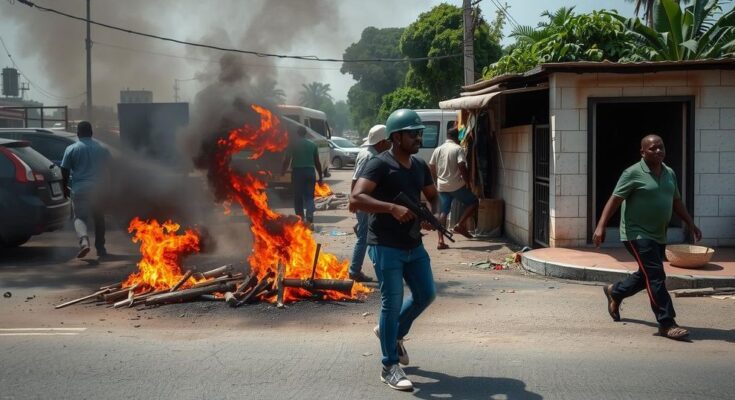Mozambique faces severe post-election violence, with 125 killed in three days amid protests over election results. The unrest stems from allegations of electoral fraud after the ruling Frelimo party’s victory was confirmed. Protests escalated into clashes, resulting in significant casualties and arrests, while the opposition claims the government is using the unrest to justify emergency measures.
In Mozambique, escalating post-election violence has resulted in approximately 125 fatalities within just three days, according to reports from a prominent non-governmental organization. The unrest follows the announcement confirming the victory of Daniel Chapo from the ruling Frelimo party, which has maintained power since 1975, amidst allegations of electoral irregularities. Protests led by opposition groups rapidly transformed into violent confrontations, prompting significant property damage and unrest across major urban areas, including Maputo.
The unrest, which began following the presidential election results announced on October 9, led to widespread discontent and riots, primarily in the capital and affected provinces such as Nampula and Beira. Government officials reported that the first wave of riots resulted in 21 initial casualties, while further clashes led to a mass jailbreak causing at least 33 additional deaths. Overall, the NGO Plataforma Decide reported a cumulative death toll of 252 since the violence began earlier this month. Furthermore, the national police stated that over 4,000 individuals have been detained since the unrest began, indicating a significant response to the protests.
The main opposition figure, Venancio Mondlane, currently in exile, has asserted that the elections were manipulated and accused the security forces of instigating chaos to justify potential emergency measures against dissent. Although some barricades restricting movement in the capital have been cleared, many obstacles remain, severely impacting transportation services.
These events underscore a critical period in Mozambique’s political landscape, marked by longstanding tensions between the ruling party and opposition factions. The aftermath of the elections and the ongoing violence raise vital questions regarding governance, civil rights, and the resilience of Mozambique’s democratic institutions.
Mozambique has been experiencing significant political turmoil following its most recent presidential elections. The elections, held on October 9, were marred by allegations of irregularities, leading to widespread discontent among opposition groups. The ruling Frelimo party, which has been at the helm since 1975, claimed a significant electoral victory, prompting protests that soon escalated into violence. Historical tensions between the government and opposition parties have often resulted in turmoil during periods of political transition, and the current situation reflects these ongoing issues.
In summary, the violence that erupted in Mozambique following the recent election results has resulted in a tragic loss of life, with over 125 individuals killed in just three days. The unrest, fueled by allegations of electoral fraud and exacerbated by government responses, highlights the fragile state of democracy and civil order in the country. As the situation unfolds, it is essential for national and international stakeholders to address these challenges to prevent further escalation and to protect the rights of the citizens.
Original Source: www.rfi.fr




